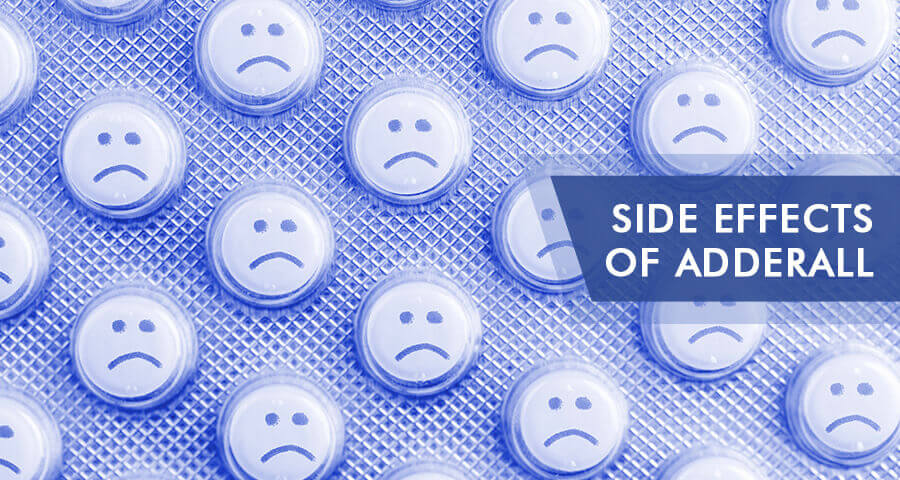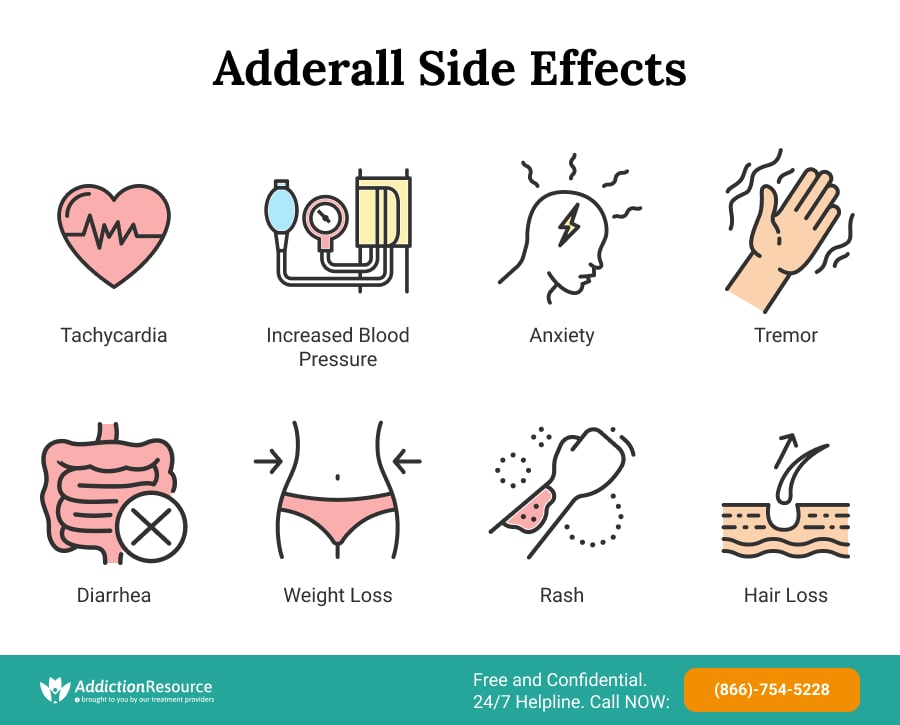
As with any other medication, there is a risk of Adderall side effects, which are the unwanted reactions to a certain medication when it is taken in normally prescribed doses. Asking a doctor information about how Adderall works can help to understand and prevent unwanted negative reactions.
Table Of Contents:
- Can it Be Harmful to a Patient’s Body?
- What Are the Short-Term Side Effects?
- Does It Cause Weight Loss?
- What Are the Long-Term Effects?
- How Dangerous is Adderall Tolerance?
- What Are the Side Effects in Men and Women?
- Can Women Take These Pills During Pregnancy or Breastfeeding?
- How to Cope with The Adverse Reactions?

Can Adderall Do Harm?
If this medication is not properly used as indicated by a doctor, it can be very dangerous and addictive. Adderall long-term effects such as mood disorders, sleep disorders, chronic headaches, anxiety, depression, constipation, abdominal pain, and tremors can be a consequence of abuse. Individuals who try to potentiate it are more likely to face the adverse effects of amphetamine-based drugs. Some users also do not know how much Adderall they should take and are prone to overdose, leading to severe long-term adverse reactions.
How Widespread are Adverse Effects?
The side effects do not necessarily emerge during the treatment process. It is essential to note that if one is concerned about any Adderall side effects, immediately consult a family physician.
The doctor will outweigh the risks against the benefits of taking this medication, and preferable dosage as the regular 20 mg pill can appear to be too high in rare cases.
All of the side effects mentioned here have been reported by at least 1% of patients taking this medication. It is also important to note that some side effects can be managed, while others might disappear over time. If the stimulant is abused or taken incorrectly, the side effects of Adderall might be even more dangerous.
What Are the Short-Term Side Effects of Adderall?
When used appropriately and for short periods of time, it can positively affect on controlling the symptoms of ADHD disorder. Adderall side effects on the brain can improve a patient’s ability by boosting alertness, attention, and energy levels. This also causes the medication to have other effects such as increased heart rate, weight changes, difficulty sleeping, and anxiousness. Some Effects of Adderall Include:
Cardiovascular
One big concern of patients is that this drug makes them sleepy and tired, or, vice versa, they have a problem with how to sleep on Adderall. Medical doctors usually answer this by explaining that Adderall is a stimulant drug, and it is better to take it in the morning to reduce some of the side effects during the night.
Cardiovascular Effects Can Be As Follows:
- Palpitations
- Tachycardia
- Increased blood pressure
- Myocardial infarction
- Heart failure
- Fatigue
Central Nervous System Disorders
One serious side effect to consider is the risk of developing mental health problems, including depression, unusual behaviors, and bipolar disorder. The chances of taking Adderall and depression symptoms developing is increased if there is a history of depression in the family. After starting the treatment, anxiety symptoms might worsen, which can be treated separately. In the case of children, when taking Adderall, psychosis may develop in the form of hallucinations and delusions.
- Restlessness
- Anxiety
- Irritability
- Depression
- Tremor
- Aggression
- Psychosis
Gastrointestinal
Gastrointestinal adverse effects in people taking Adderall include:
- Dry mouth
- Diarrhea
- Altered taste
- Constipation
- Loss of appetite
- Weight loss
Allergic
- Rash
- Itching
- Swelling of the face and limbs
- Difficulty in breathing
- Endocrine
- Decreased libido
- Prolonged erection
- Hair loss
Does Adderall Make You Lose Weight?
It is known to make some people lose weight primarily because it contains amphetamine, which is well-known to encourage weight loss.
Various Ways in Which Amphetamine Drugs Can Do This Include:
- Speeding up calorie burning: amphetamines cause increased energy expenditure by increasing the body’s rate of metabolism or breaking down nutrients and increasing muscular activity by causing an individual to become restless. This increased muscular activity burns calories to produce energy.
- Suppressing appetite: individuals will observe a reduction in food intake.
- Reduced digestion and absorption of food: Amphetamines cause reduced movement of the intestines and reduced secretion of digestive substances, leading to poor digestion and absorption, ultimately leading to a significant decrease in pounds.
- Reducing water intake and increasing water excretion. This loss of body water contributes to the loss of body weight observed with the drug.
When comparing Adderall vs Vyvanse weight loss, make sure the benefits outweigh the risks of using the drug.
How Fast Does One Lose Weight on Adderall?
The speed at which a person may lose pounds depends on a number of factors, including the dosage, frequency of intake, and genetics. Generally, the weight loss can be, on average, 20 lbs within 6 months for both men and women.
The form of the drug used also influences how fast one can lose the excess fats. This drug is available in two forms: immediate-release and extended-release forms. Whilst taking XR pills, weight loss is more likely than with the IR form, except if the IR version is used several times in a day. Both usages may, at certain doses, cause significant weight loss over the cause of a week.
What Risks are Associated with Adderall Use for Weight Loss?
The problem with using this stimulant for weight loss purposes is the chances of encountering adverse effects and developing an addiction to the medication. Although it can assist in weight loss, the U.S. Food and Drug Administration (FDA) has only approved the use of this drug for the treatment of ADHD and narcolepsy. However, a doctor can prescribe the drug ‘off-label’, which means it can be prescribed by a doctor for other uses even though the FDA has not accepted or approved that use.
Therefore patients should not use Adderall for weight loss purposes unless prescribed by a doctor. Having a prescription is important because a doctor will be able to monitor a patient to ensure the drug does not cause any toxic effects.
Once a person starts to use Adderall as a diet pill, some people may start to take higher doses than recommended. Over time, this leads to tolerance, and the body will start to require a much higher dose to achieve the desired effects. In turn, this will increase the risk of overdose. If the drug is used without a doctor’s prescription or advice, a person may not be aware of the precautions required and the potentially dangerous interactions of Adderall.
Additionally, achieving weight loss with the aid of this medication is usually necessary to take the drug long term. However, such use will increase the chances of having withdrawal symptoms if abruptly stopped. Some of these symptoms of withdrawal from Adderall include fatigue and sleepiness, increased appetite, memory loss, difficulty concentrating, and irritability.
How Does Adderall Affect Weight in Children?
Adderall is used for the treatment of ADHD in children, and it also causes stunted growth. Ran D. Goldman’s study on ADHD stimulants and their effects on children shows that children who use it develop slowed growth. However, this changes when the drug is stopped, and the children can increase their body mass index (BMI).
It is advisory to express concern if a doctor prescribes Adderall to a child or request to be referred to a dietitian or nutritionist to ensure an appropriate diet plan is followed for the child to maintain a healthy diet.
What Are the Long-Term Effects of Adderall?
Adderall is not meant for long-term treatment because, generally, ADHD tends to disappear with adulthood. There are various risks associated with taking it long-term; however, these risks are accentuated if this medicine is abused and/or taken in large doses. Taking a stimulant drug like Adderall changes a person’s brain chemistry, which has an effect on their motivation and reward systems. This will change how a person feels and how they can feel pleasure. Mood disorders are a big concern when it comes to using Adderall long-term.
Other Long-Term Effects May Include:
- Difficulty in sleeping
- Fatigue
- Increased blood pressure
- Abnormal heart rhythms
- Headaches
- Dry mouth
- Difficulty in breathing
- Aggression
- Depression
- Suicidal thoughts
- Anxiety
- Constipation
- Weight loss
- Tremors
Understanding Adderall Tolerance
Tolerance refers to a bodily process in which systems impacted by a substance steadily become used to the presence of the substance, lessening the effects produced through consumption. Adderall tolerance develops when the central nervous system becomes so used to the presence of the drug that its effects seem weaker or cannot be noticed at all. When this occurs, some patients may assume that it has stopped working and seek out a new medication.
It is important never to take a greater amount of the drug other than prescribed. Only after a doctor’s consultation, a dose can be adjusted.
What Contributes to Adderall Tolerance?
The tolerance is caused by the mere presence in the body over an extended period of time. When used in the short term, the body does not have time to adjust to the presence of the drug, but when used for more than 10 days, the possibility of developing the condition builds, leading to concerns about Adderall not working anymore.
Any medication that impacts the central nervous system is susceptible to tolerance, and this ADHD medication is no exception. However, there are certain factors that can make the condition more or less likely to occur.
Variables That Impact Tolerance Onset:
- The Initial Dose Taken: When patients begin taking the drug, it is best to do so at the lowest possible dosage and then increase if needed. This is problematic as larger doses flood the central nervous system with the effects of the drug, which triggers the condition and eventual Adderall dependence and addiction.
- Increased Doses: As tolerance develops, the therapeutic effects of the medication become less pronounced; eventually, the patient may no longer notice a difference between their ADHD behaviors with Adderall and without it. Doctors tend to respond to this by increasing the dose, but eventually, the patient will reach the maximum safe dose and still suffer from tolerance.
- Dosage Frequency: Just as important as the dose taken is how often the medication is taken. Those who take the drug multiple times a day are much more likely to develop tolerance than those who take one dose each day. Patients should discuss this issue with their doctor when the drug is prescribed.
- Type of the medication. Many think that the instant release formula is more likely to cause tolerance because it floods the system, but it is actually less likely due to the body getting the chance to spend more time each day drug-free and Adderall XR side effects.
- Length of Time Taken: The longer a patient takes the drug, the more likely it is that they will develop tolerance. With high doses of Adderall XR, tolerance can develop in roughly 10 days. Ultimately, tolerance is a risk for any patient who takes the drug. Those who take the drug on an as-needed take years to develop tolerance, but it still happens.
- Interactions with Other Drugs: tolerance may occur when other drugs or substances are taken simultaneously, increasing or prolonging its effects.
- Variables Within the Patient: In addition to the items above, variations among individuals can make tolerance more or less likely to occur. Genetics, diet, stress levels, and nightly hours of sleep can impact predisposition to tolerance. Those who are more stressed and less healthy are more likely to become tolerant of the drug.
How to Prevent or Reduce Adderall Tolerance?
Preventing tolerance should be a concern for anyone taking the drug. For one, it is dangerous and leads to addiction. For another, it makes it impossible to receive the therapeutic benefits of the drug. Given that not all ADHD drugs are effective for every patient, there can be a strong motivation to avoid the lessening effects of tolerance.
But can tolerance be prevented? That depends on who to ask. While it is debatable whether tolerance can be fully prevented, most agree that there are medications, supplements, and lifestyle changes that can be taken to stave it off from some time.
While preventing tolerance is a deal, tolerance still occurs, and at an alarming rate. Those who have developed tolerance need to be able to battle against it in order to prevent dependence and addiction.
Below are the Steps to Take When Tolerance is Developed:
- First, speak to the prescribing doctor about the issue. If tolerance has developed, increasing the dose is not recommended. The doctor may also look into supplements to take with Adderall that increase its effectiveness or reduce tolerance.
- Next, ask for a referral to a behavioral health specialist. The patient should request one who has experience working with addiction. This is important as tolerance can quickly escalate, and the patient must know if help is needed in order to take the appropriate steps.
- If the behavioral health specialist is concerned, look into rehabilitation programs. This problem tends to strike young adults the hardest, so a teen rehab center may be required.
What Are Adderall Side Effects in Men and Women?
The danger of Adderall adverse effects is that it is a very strong stimulant that can often lead to life-threatening side effects in both sexes.
Adverse Reactions in Men
Adderall side effects in men are usually related to their prostate, which can lead to difficulty in urinating, sharp pain, and discomfort. These symptoms can disappear once the patient stops taking the drug, but it is still advisable to consult a family physician.
Adverse Reactions in Women
Adderall side effects in women are more related to their tendency to abuse it and that the consumption among women is increasing in comparison to men. Women also tend to abuse this stimulant in order to lose weight quickly.
Can One Take Adderall While Pregnant?
The US FDA labels the substance as a category C drug. This information means there haven’t been enough human studies to confirm the drug’s harm to the fetus during pregnancy. Clinical studies conducted on humans are lacking for obvious reasons – risks associated with fetal harm throughout the pregnancy stages.
There have been multiple animal studies that have shown it can have an adverse effect on the fetus during pregnancy in mice models, but it is important to remember these studies aren’t necessarily predictive of human reactions. In short, the use of Adderall during pregnancy has not been proven safe. Still, as a category C drug, its potential benefits could prevail and warrant use in pregnancy.
Recent studies have found a massive increase in popularity among women, a staggering 750 percent rise between 2002 and 2010 to be precise. When it comes to Adderall and pregnancy, numbers significantly drop but still reflect a substantial proportion. Out of 675 women in pregnancy surveyed in 2013, over 1 percent declared the use of the substance. This is a monumental surge of women who are pregnant and use Adderall, especially when one considers the 0.025 percentage for 2002.
What are the Dangers to a Mother During Pregnancy?
Implications are hard to predict for mothers who use this medicine. Pregnancy is synonymous with hormonal changes. For those in pregnancy struggling with ADHD, it can be particularly difficult to manage related symptoms – in most cases; they are exacerbated. Still, it is important to keep in mind each pregnancy is different, and some women will actually find it easier to handle their use of Adderall while pregnant.
What are the Dangers to a Fetus?
In animal testing, mothers who have been exposed to a heavy dose have had adverse effects on their fetus. It is impossible to predict the outcomes in humans at a similar dosage of Adderall XR 30mg, but it is safe to conclude use in pregnancy should be avoided, if at all possible. Those who have an ADHD diagnosis should ensure unplanned pregnancy is out of the question by using contraception pills and other preventative methods.
Note there have been no proven adverse effects in the use of Adderall and birth control tablets.
Effects on a Fetus in Animal Studies Included:
- Birth defects
- Permanent behavioral and neurochemical changes
- Lower weight in newborns
- Premature birth
Can You Take Adderall While Breastfeeding?
Because amphetamine is known to transfer into breast milk, a question of whether the drug is safe to use after pregnancy arises. If the use is inevitable, moms who take the drug should monitor the baby’s weight gain, sleeping patterns, appetite, and behavior closely.
Should the baby show no signs of restlessness, insomnia, reduced weight, and other symptoms, a mother can continue to medicate. Otherwise, she should consider a different treatment strategy or hiring a nurse.
Some human trials have observed how mothers react to Adderall while breastfeeding. It appears to cause a significant reduction in serum prolactin. This hormone plays an important role in lactation and affects a wide range of bodily functions, including immune system regulation. In addition, ADHD stimulants in children have been linked to a range of side effects.
Potential Complications Include:
- Sleep deprivation
- Appetite loss
- Growth impairment
- Tics
- Irritability and mood changes
If one suffers from the side effects and wonder how to stop taking Adderall, it is important to consult with the prescribing doctor before quitting medication or an addiction specialist if battling dependence.
How to Cope with Adderall Side Effects?
Adverse effects of this medication can emerge due to many factors, which include incorrect dosage, drug abuse, or individual intolerance. In any case, these conditions shall be brought to the doctor who prescribed this stimulant at the earliest convenience. Only a professional medical specialist can advise whether the benefits of the drug outweigh its negative influence, and decide whether the patient shall continue taking Adderall, switch to another medication, or cease treatment at all.
In general, it is assumed that this is a safe drug to use due to the fact that it is prescribed to both adults and children, but the dangers of this medicine are vastly overlooked. If a person does not follow the prescription information properly, for example, tries to learn how to snort Adderall instead of taking it the prescribed way, it can have life-threatening side effects. They can also be at risk of developing dependency and increased tolerance to the effects of Adderall, which can ultimately lead to a worsening of serious side effects.
Page Sources
- Medline Plus. Dextroamphetamine and Amphetamine. 2019. https://medlineplus.gov/druginfo/meds/a601234.html
- Sichilima T., Rieder M. J. Adderall and cardiovascular risk: A therapeutic dilemma. Paediatrics & Child Health. 2009; 14(3): 193–195. doi:10.1093/pch/14.3.193. https://www.ncbi.nlm.nih.gov/pmc/articles/PMC2690554/
- The US Food and Drug Administration. ADDERALL® (CII). 2007. https://www.accessdata.fda.gov/drugsatfda_docs/label/2007/011522s040lbl.pdf
- Clinical Trials, Examining Tolerance to CNS Stimulants in ADHD, 2013, https://clinicaltrials.gov/ProvidedDocs/08/NCT02039908/Prot_SAP_000.pdf
- Steven M. Berman, Ronald Kuczenski, James T. McCracken, Edythe D. London, Potential Adverse Effects of Amphetamine Treatment on Brain and Behavior: A Review, 2009, https://www.ncbi.nlm.nih.gov/pmc/articles/PMC2670101/
- Susan L. Smalley, Sandra K. Loo, T. Sigi Hale, Anshu Shrestha, James McGough, Lisa Flook, Steven Reise, Mindfulness and Attention Deficit Hyperactivity Disorder, 2010 https://www.ncbi.nlm.nih.gov/pmc/articles/PMC2827240/#R37
- James M. Swanson, Long-acting stimulants: development and dosing, 2005, https://www.ncbi.nlm.nih.gov/pmc/articles/PMC2547091/


 Reviewed by:
Reviewed by:  Written by:
Written by: 


 FindTreatment.gov
FindTreatment.gov